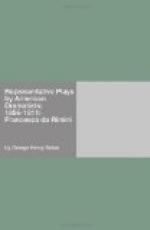Hosts of dramas have been written on “Francesca da Rimini,” and every poet has essayed at one time or another to surpass Dante’s incomparable lines. Music scores have glorified this passionate love story, while marble and canvas have caught the external expression of it. In its portrayal, actual history has taken on legendary character, and so “Francesca da Rimini” now ranks as a theme with the history of Lancelot and Guinevere, of Tristan and Isolde. It has become the inspiration for Maeterlinck in “Pelleas and Melisande,” who has viewed the Italian passion through a mirage of mysticism.
Into “The Divine Comedy,” the account of Francesca and Paolo is dropped, keen, sensitive and delicate, as though the poet, a friend of those concerned, wished to cover the hard fact of illicit love in an ecstacy of human feeling. Dante, the supreme master of his age, the incomparable lover of Beatrice, differentiated this tragedy from countless incidents of like character which marked his age. Had the story been preserved only in the form recorded by Boccaccio, it would have been lost in its minor details of history; whereas Dante has glorified it.
By the very fact that Dante places the two lovers in the circle of the Lustful, it is clear that he realized the enormity of their sin. The theory that his friendship with Guido Novella, the nephew of Francesca, made Dante refrain from entering fully into the incident, will not hold, when it is remembered that the cantos of the Inferno were written in 1300, seventeen years before the poet reached Ravenna, and accepted the hospitality of the Polenta house. Dante’s infinite compassion is, therefore, the cause for the compressed poetry of this famous passage.
Dante’s Francesca lines have been infinitely translated. Longfellow is conscientious; Byron chafes to be freed of the original Italian, and his lines are irksome; Rossetti sees and feels, but he is laboured. Dante, infinitely translated, remains supreme.
The poems on this ideal love legend are of infinite variety. Tassoni describes Paolo, the warrior, consumed with ravishing love, “shrunk with misery;” he fails to reach the youthful passion, and is as mediaevally chivalric as is Chaucer in “The Knightes Tale” of Palamon and Arcite. Leigh Hunt resorts to stilted narrative and description.
Byron once thought to write a drama on this subject; had he done so, Silvio Pellico might have had a formidable rival. More or less, all the playwrights have gone to Italian history, and the more exact they became, the more gross the situation. F. Marion Crawford fell on this rock of accuracy, when he wrote his Francesca play for Mme. Sarah Bernhardt.




